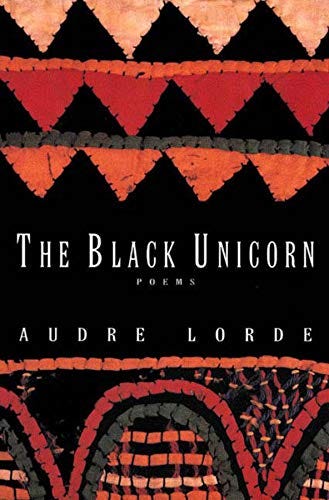Reading Audre Lorde in the spring.
In "Poetry Is Not a Luxury," Audre Lorde describes poetry as crucial for the survival of Black women.
Poetry allows us access to our deepest feelings, and our ancestral knowledge, Lorde writes. It will enable us to dream and give words to those dreams. Both are necessary for the struggle toward liberation. Both are part of community-based resistance against city and state violence.
To change our world, Lorde encourages readers to live a life revolving around "our own ancient, non-european consciousness of living." We must "cherish our feelings" and "respect those hidden sources of our power from where true knowledge and, therefore, lasting action comes."
Women can connect all of these ideas, and this connection happens through poetry. Poetry allows us to be free of how white supremacy conditions us to think and exist. We dream, our minds uninhibited by physical limitations. In these dreams, led by our unconscious, liberated mind, we have new thoughts, images, and sensations that we try to remember and capture when we wake. Lorde describes how these are foundational to changing the world. We must first dream and imagine ways of surviving and thriving outside the oppressive systems of our physical world—outside the white man's imagination. "Poetry is the way we help give name to the nameless so it can be thought," Lorde writes.
Poetry allows us to be free of how white supremacy conditions us to think and exist.
Lorde is insistent: We do not connect to our feelings and dreams to say we created something new or want to feel unique. We are not starting anew but building upon and returning to work done before us by Black and Indigenous women. We are learning to reject the ways of white, Christian, European men. We are learning to trust the intuitive knowledge and power of ourselves, our communities, and those who came before us.
Lorde writes:
The white fathers told us: I think, therefore I am. The Black mother within each of us—the poet—whispers in our dreams: I feel, therefore I can be free. Poetry coins the language to express and charter this revolutionary demand, the implementation of that freedom.
***


"Poetry Is Not a Luxury" is part of Lorde's Sister Outsider. The collection, first published in 1984, features 15 essays and talks Lorde wrote or presented between 1976 and 1984. The collection includes "The Transformation of Silence into Language and Action," "Uses of the Erotic: The Erotic as Power," "Man Child: A Black Lesbian Feminist's Response," and "The Master's Tools Will Never Dismantle the Master's House."
Lorde was queer, a radical womanist born in Harlem in 1934 to Caribbean parents. She was a socialist poet, activist, writer, professor, and philosopher. Her writing and work focused on lesbian identity, anti-blackness, racism, women's anger, and sexism. It includes Zami: A New Spelling of My Name, The Black Unicorn, The First Cities, Cables to Rage, and New York Head Shop and Museum.
Vani, a friend, professor, and fellow writer, invited me to imagine writing outside of genres and rules, encouraging me to evolve creatively and without restrictions and fear of the white gaze. She talks to me often about Lorde's work, citing how the author used prose and poetry.
For the last six months or so, I am reading Sister Outsider and The Black Unicorn. I am reading her words on the erotic slowly and allowing it to shift how I think about power and pleasure and sensations. I read The Black Unicorn several times a month, sometimes three to four poems at once, other times sitting with a verse or two. "A Woman Speaks" is my favorite and the poem I return to the most often. Lorde writes:
my magic is unwritten… /
I am treacherous with old magic /
and the noon's new fury… /
I am /
woman /
and not white.
Her poetry speaks to me immediately. It names the power we feel, which many of us are learning to recognize and accept.
When I am most empowered, my most liberated, free of fear and anxiety, I feel magical.
***
Lorde's "Poetry Is Not a Luxury" prose is also theological. (It's Easter week, so everything goes back to faith, theology, and religion for me this week.)
She wants us to connect to a part of ourselves that we have spent a lifetime repressing. Her work challenges us to understand and connect with sensations, forces, and parts of ourselves, our communities, that feel almost divine. To go beyond our conditioning by hetero-capitalist-white supremacist-misogynistic structures.
I read this essay three times this week, and my analysis and writing on Lorde's work will evolve.
I wanted to highlight the poet and author's work this week and how it informs how I think about and write Bronx Frontlines.
I am also thinking a lot about the power of dreams and the divine and what it means to love and trust ourselves and the people around us, especially as I go through Lorraine Avila's The Making of Yolanda La Bruja, which debuted on April 11.




really enjoyed reading this! her work has been in my TBR list for a minute and i need to prioritize it a little more